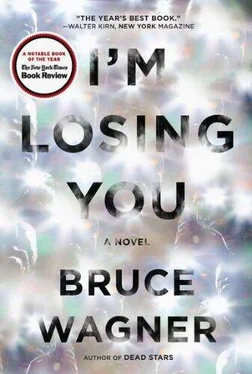For sure. But I point to Traci Lords as an example of how nothing can get in your way if you’re really motivated. I look at what I’m doing now as a preparation for film. It’s a legitimate tool.
“Legitimate Tool”—I like that! Can I use that as the title for my next film?
I think that when my time comes—
I’d love to watch your time come.
— (laughs) that I’ll be able to make that transition. Things are different than even ten years ago, especially so as we approach the fin-de-siècle.
The huh? The who? The what?
It’s French.
I didn’t know you were bisexual — I mean, bilingual—
( laughs ) It means “end of the century.”
( Of course, he knew what it meant ) Can you touch yourself, Kiv? ( She does. CAMERA PUSHES IN for EXTREME CLOSE-UP ) That’s great. You know, you’re a cunning bilinguist.
( JUMP CUT to CLOSE-UP of Kiv’s face, sometime later. Still the green lawn and blue sky, suburban ratcheting of distant sprinklers. Kiv moans, biting lip dramatically. CAMERA drifts down to breasts, jiggling against her athletic arm. Follows until we reach wrist and flailing hand with long, lacquered fingernails. Then a MEDIUM SHOT of Kiv as a muscular long-haired surfer in Speedo briefs ENTERS FRAME from b.g .)
Chet Stoddard
The housewife in toreador pants had been squinting at him from the moment he walked in. When Horvitz introduced him, the woman went nuts.
“Chet Stoddard who had the talk show?”
“That’s right.” Oh Christ, he thought. Why hadn’t he used an alias?
“I knew it!”
“Isn’t that something,” said the husband.
“Great memory,” said Chet with a Dick Clark smile.
“He doesn’t tell me anything , this guy.” Horvitz smiled too, but a little awkwardly. He didn’t like surprises, especially at the beginning of a pitch.
“That was a good show . We watched that show, didn’t we, Kenny?”
“Yes, we did,” said Kenny, matter-of-fact. “You were one of the first guys to go into the audience.”
“That’s right,” said Chet. “With the long microphones. They called them shotgun mikes.”
“Shotgun mikes!” Kenny effused, turning to his wife. “I remember that.”
“ We’re not going to be on a talk show, are we?”
“Not even an infomercial,” said Horvitz, taking over the reins.
“Not today, I hope,” said Marion. “I’m having a bad hair day.”
ViatiCorps helped the terminally ill cash in their life insurance, providing the option of “accelerated benefits.” The debt-ridden former personality dropped by for an interview, then signed on as an “independent seller’s advocate” trainee. Kenny and Marion Stovall were glad to have a nominal public figure in the house. Somehow, it made the investment more of an adventure, and less of a risk.
“How did you become involved, Chet?”
That was the dentist.
“Well, I do a lot of fund-raising,” he lied. “Walkathons, benefits. I met Stu at the carnival.”
“For children with AIDS.”
“I keep wanting to go,” said Marion, demurely glancing at her mate, “but somehow we never make it.”
“I think,” said the dentist, “you have to be invited. They don’t take people off the street…”
“We’re hardly ‘off the street,’ darling.”
“Oh I think we can wangle an invitation,” Horvitz said. “They had a tremendous amount of celebrities this time around.”
“Great turnout,” said Chet, the sudden civic bureaucrat.
“Tom Hanks and his wife, Rita, always make an appearance. They’re good people. Gee…who was there? Jerry Seinfeld, Marcia Clark, Jay Leno. There’s someone who’ll give you a run for your money.”
Chet rolled with the punch. “He’s got a helluva car collection. But I was an unlucky man this year — got trapped in a ring-toss booth with Sharon Stone. It was sheer hell.” The dentist asked if the star wore panties and was promptly swatted by his wife. “Let’s just say that with or without, she arouses some fairly basic instincts.” Everyone laughed as Marion went for coffee.
“Anyway,” said Horvitz, “Chet liked what we were doing and wanted to come along to see how this thing works, on a personal level.”
“I hope that’s not too much of an intrusion,” Chet said diffidently.
“Hell, no,” said Kenny, “but I warn you: by the time you leave here, I will be your dentist.”
“Kenny, stop it!” cried Marion, from the kitchen.
“You have to promise to bring in a photo for my Wall of Stars.”
“It’s a deal.”
Horvitz dug in. “Kenny, your profession certainly hasn’t been untouched by this terrible disease and its attendant controversies.”
“We certainly have been.”
“As you know, there’s a lot of lip service given to ‘awareness.’ What’s wonderful about ViatiCorps — and its database of professionals like yourselves — is that you and Marion can do something concrete, something tangible , to ease human suffering.”
“That’s what’s so appealing,” said Marion, bringing in the tray. She looked to her husband, then added: “To me.”
“How exactly does it work?”
“Simplicity itself. I have a client who’s perfect to wet your feet with.”
Horvitz reached for his satchel, and Chet passed it on. He sorted through documents, grousing about life as a “great paper chase.” Then he found what he was looking for: a Polaroid of a wispy-haired man in his forties. Chet knew the picture had been taken by a nurse who supplied ViatiCorps with leads on the dying, for a percentage.
“He’s a costume designer. Has a T-cell count of twenty-two.”
Marion looked pained as she examined the photo. “Is that very bad?”
“It’s not great.”
“What’s a normal count, Stu?” asked the dentist, with alacrity.
“It’s a little arbitrary, but as a guide or indicator, that’s about all we have. The government defines full-blown AIDS as anything under a hundred T cells.” Marion screwed her eyes and nodded. “You and I may have six or seven hundred. Funny thing is, you can have nine hundred and still be on your way out.”
Ken shook his head. “That’s insidious.”
Marion tucked now shoeless feet underneath her and studied the photo; Chet noted a passing resemblance to Sally Field. “What’s his name?”
“Philip Dagrom. He’s actually fairly well known for what he does. He was working on Blue Matrix up until a month or so ago. I saw him on Friday. He’s pretty much clinically depressed.”
“Who wouldn’t be?” said the dentist.
“He doesn’t look all that terrible,” said Marion, grimly fascinated. “Don’t they usually have those spots? What are they called?”
“Kaposi’s sarcoma. Phil’s had everything but KS. Now, he’s losing his sight.”
“Real science fiction stuff, isn’t it?” Chet chimed in.
“It’s diabolical, believe me,” said Horvitz. They made a fairly decent tag team. “But Phil’s a fighter. We’re still looking at an expectancy of three to six months — don’t quote me now!”
“Was he an addict?”
“No, no. A hemophiliac — also gay.”
“Wow,” said Marion. “Double whammy time.”
“I’ve worked on hemophiliacs.”
“I always wanted to know,” said Chet, “how you fill a cavity in that situation.”
“ Very carefully! ” laughed the dentist. “What kind of insurance does he have?’
“A two-hundred-thousand-dollar policy. We can get it for maybe sixty cents on the dollar.”
Читать дальше












